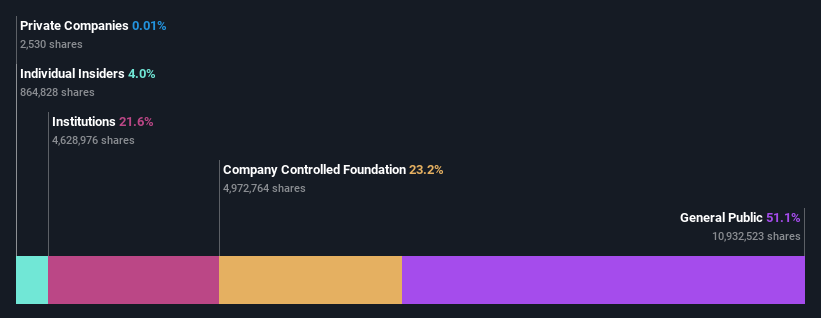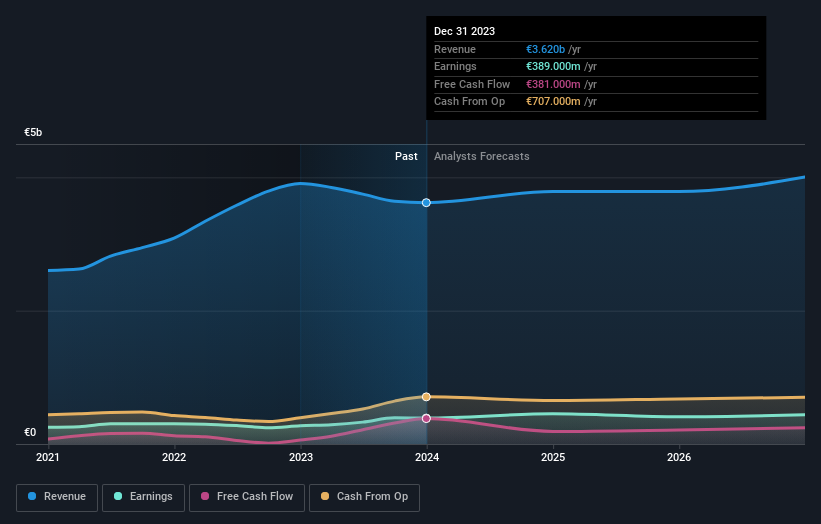Rockwool A/S' (CPH:ROCK B) biggest owners are retail investors who got richer after stock soared 8.4% last week

Key Insights
- Significant control over Rockwool by retail investors implies that the general public has more power to influence management and governance-related decisions
- 45% of the business is held by the top 25 shareholders
- Institutions own 22% of Rockwool
To get a sense of who is truly in control of Rockwool A/S (CPH:ROCK B), it is important to understand the ownership structure of the business. And the group that holds the biggest piece of the pie are retail investors with 51% ownership. In other words, the group stands to gain the most (or lose the most) from their investment into the company.
As a result, retail investors were the biggest beneficiaries of last week’s 8.4% gain.
Let's take a closer look to see what the different types of shareholders can tell us about Rockwool.
View our latest analysis for Rockwool

What Does The Institutional Ownership Tell Us About Rockwool?
Institutions typically measure themselves against a benchmark when reporting to their own investors, so they often become more enthusiastic about a stock once it's included in a major index. We would expect most companies to have some institutions on the register, especially if they are growing.
As you can see, institutional investors have a fair amount of stake in Rockwool. This implies the analysts working for those institutions have looked at the stock and they like it. But just like anyone else, they could be wrong. When multiple institutions own a stock, there's always a risk that they are in a 'crowded trade'. When such a trade goes wrong, multiple parties may compete to sell stock fast. This risk is higher in a company without a history of growth. You can see Rockwool's historic earnings and revenue below, but keep in mind there's always more to the story.

Hedge funds don't have many shares in Rockwool. The Rockwool Foundation, Endowment Arm is currently the company's largest shareholder with 23% of shares outstanding. 15. Juni Fonden,Endowment Arm is the second largest shareholder owning 6.1% of common stock, and Dorrit Kahler holds about 4.0% of the company stock.
A deeper look at our ownership data shows that the top 25 shareholders collectively hold less than half of the register, suggesting a large group of small holders where no single shareholder has a majority.
While studying institutional ownership for a company can add value to your research, it is also a good practice to research analyst recommendations to get a deeper understand of a stock's expected performance. There are a reasonable number of analysts covering the stock, so it might be useful to find out their aggregate view on the future.
Insider Ownership Of Rockwool
While the precise definition of an insider can be subjective, almost everyone considers board members to be insiders. Company management run the business, but the CEO will answer to the board, even if he or she is a member of it.
Insider ownership is positive when it signals leadership are thinking like the true owners of the company. However, high insider ownership can also give immense power to a small group within the company. This can be negative in some circumstances.
Our most recent data indicates that insiders own some shares in Rockwool A/S. This is a big company, so it is good to see this level of alignment. Insiders own kr.2.2b worth of shares (at current prices). Most would say this shows alignment of interests between shareholders and the board. Still, it might be worth checking if those insiders have been selling.
General Public Ownership
The general public, mostly comprising of individual investors, collectively holds 51% of Rockwool shares. With this amount of ownership, retail investors can collectively play a role in decisions that affect shareholder returns, such as dividend policies and the appointment of directors. They can also exercise the power to vote on acquisitions or mergers that may not improve profitability.
Next Steps:
It's always worth thinking about the different groups who own shares in a company. But to understand Rockwool better, we need to consider many other factors.
I like to dive deeper into how a company has performed in the past. You can access this interactive graph of past earnings, revenue and cash flow, for free.
But ultimately it is the future, not the past, that will determine how well the owners of this business will do. Therefore we think it advisable to take a look at this free report showing whether analysts are predicting a brighter future.
NB: Figures in this article are calculated using data from the last twelve months, which refer to the 12-month period ending on the last date of the month the financial statement is dated. This may not be consistent with full year annual report figures.
New: AI Stock Screener & Alerts
Our new AI Stock Screener scans the market every day to uncover opportunities.
• Dividend Powerhouses (3%+ Yield)
• Undervalued Small Caps with Insider Buying
• High growth Tech and AI Companies
Or build your own from over 50 metrics.
Have feedback on this article? Concerned about the content? Get in touch with us directly. Alternatively, email editorial-team (at) simplywallst.com.
This article by Simply Wall St is general in nature. We provide commentary based on historical data and analyst forecasts only using an unbiased methodology and our articles are not intended to be financial advice. It does not constitute a recommendation to buy or sell any stock, and does not take account of your objectives, or your financial situation. We aim to bring you long-term focused analysis driven by fundamental data. Note that our analysis may not factor in the latest price-sensitive company announcements or qualitative material. Simply Wall St has no position in any stocks mentioned.
About CPSE:ROCK B
Rockwool
Produces and sells stone wool insulation products in Western Europe, Eastern Europe, North America, Asia, and internationally.
Flawless balance sheet with solid track record and pays a dividend.


